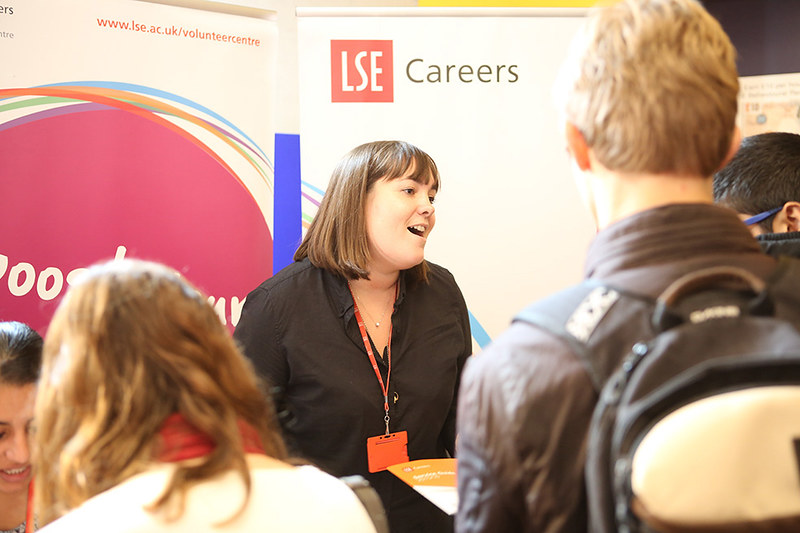Welcome week is the week in which new students usually first arrive on campus and receive the initial information regarding their studies here. Naturally, you might feel a bit overwhelmed at the beginning, but do not worry, you are not alone: Former Student Ambassador Mikhael Farr tells you about his experiences of welcome week last year and who he reached out to to receive the support he needed.

So here we are, you made it through the process and physically showed up to LSE. Kudos! The first most important thing to do right now is to give yourself a big pat on the back for getting that far! It is also more than fine to gloat and blab about getting into LSE; we all do it! – OK, maybe not voice it externally but you know what I mean…
Your first interaction with LSE will be welcome week where anyone who’s anyone is there! Your peers, academics, staff members and even LSE’s mascot will be waiting to meet you! You’ll be hit with mixed feelings of excitement and confusion at times, which is totally normal. Many scholars went through it before you and will go through the same in years to come. I advise you to embrace it as it’s an experience you’ll remember for a long long time and might even pass it on to future generations. Rest assured that it is normal to have all these mixed feelings as it is a significant part of the experience.
My welcome week was an ‘interesting one’; I managed to lose my way, several times, to the designated rooms where introductions were given, I forgot my transcripts back home (as in the country I’m originally from, not up the road), and there were days where I didn’t have any sort of identification on me to grant me access to facilities -before having the student card issued- so you can imagine the mess I was in and the confusion I felt. YET, everything worked out smoothly even with my state of the art clumsiness because of a couple of things I picked up that I want to share with you.
Let Questions Be Your New Best Friends
You will find out that welcome week is rich on academic and admin requirements that you need to know and use from day one, ranging from simple tasks such as obtaining your identification card to handling the tools available to select the modules you’re interested in. The volume of information shared that week got me excited, yet confused and overwhelmed at times. What really helped me go through it was asking questions! LSE is great in terms of the resources that are available to you all year round, especially during welcome week where you have loads of academics, students and staff members eager to help.
Just keep in mind that there is no wrong question, no wrong department and definitely no wrong person to ask; LSE’s open door policy extends to the tiniest clerical questions and the grandest academic queries.
Know the Powers that Be: Your Department Staff
What really surprised me was the collective knowledge that department staff have, not only on department-specific matters but also on most matters that are relevant to your day-to-day experience at LSE. Make sure you pay them a visit during welcome week, and ask them some ‘serious’ questions, just for kicks, about the chicken-and-the-egg situation and/or how aliens are targeting LSE students especially in your department. They will advise you to visit a certain someone who specialises in ‘aliens targeting LSE students’ and uses ‘special’ methods to make them go away… which feeds right into my point that they will give you advise nevertheless! As an International Development (ID) student, I can honestly say that my departmental staff were the ‘google’ of LSE, the powers that be at LSE (that even rhymes), and I’m sure yours will be too, SO make sure you tap into that fountain of knowledge early on; they know the secrets of the trade and are generous in sharing them.
Location Location Location… Have Fun!
This is by far the best part of welcome week, F.U.N! You’ll be setting on a new exciting adventure in the heart of London and might as well make the best of it. Get to know your surroundings by meeting your peers, taking multiple on-campus guided tours, walking around and losing yourself in one of the most entertaining cities in the world. Also, make sure you use your student concessions for everything humanly possible, especially travel, food and entertainment. The savings you make could be allocated to recreational activities and pub-crawls – I mean social beverages – or in my case more food! LSE is brilliantly located in the heart of London which makes it really easy for you to indulge in what the city has to offer, and she has a lot to offer!
Good luck and see you soon at the alumni events!
Mikhael Farr was a Student Mentorship Ambassador for the Department of International Development and studied for an MSc in International Development and Humanitarian Emergencies during the academic year 2018/19. Prior to joining LSE, Mikhael obtained an MBA from the University of Technology, Sydney (UTS), and worked for multiple UN agencies and governments.
The views expressed in this post are those of the author and in no way reflect those of the International Development LSE blog or the London School of Economics and Political Science.





